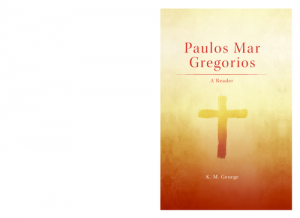Paulos Mar Gregorios: A Reader
Description
Paulos Mar Gregorios: A Reader is a compilation of the selected writings of Paulos Mar Gregorios, a metropolitan of the Malankara Orthodox Syrian Church of India and a former President of the World Council of Churches. The book deals with his thought in the areas of ecumenism, orthodox theology, philosophy, interfaith dialogue, and philosophy of science. The book will be of special value to the students of ecumenism, Eastern and Oriental Orthodoxy, Indian philosophy, interdisciplinary studies, and holistic education.
- Hardcover
- Ebook
Contents
Part 1: Philosophy—Western and Indian/Asian
1.1. Philosophy, Meaning, and History—Problem of Methodology
1.2. European Philosophy and Enlightenment
1.3. Philosophy of Science
1.4. Indian/Asian Philosophical Insights
1.5. Epistemology—Western and Indian
1.6. Philosophy of History
1.7. Quest for Certainty
1.8. Critique of Ideology
Part 2: Ethical Dimensions—Peace, Ecology, Holistic Healing, Interfaith Dialogue
2.1. World Peace, Justice, and Disarmament
2.2. Ethics and Ecology
2.3. Holistic Healing
2.4. Interfaith Dialogue
Part 3: Autobiographical Glimpses, Worship, and Spirituality
3.1. Autobiographical Glimpses
3.2. Joy of Freedom (Worship and Spirituality)
Part 4: Theology and Ecumenism
4.1. God-World-Humanity Relationship—Insights from Gregory of Nyssa
4.2. Freedom and Authority
4.3. Sacramental Theology
4.4. Scriptural Witness—Interpreting the Bible
4.5. The Communitarian Dimension of Faith and Knowledge
4.6. Man/Humanity as Mediator—Theological Anthropology
4.7. The Mystery of Incarnation
4.8. Dimensions of Ecumenism
4.9. Theological Method
4.10. Church and Ministry
4.11. Liberation and Salvation
Part 5: Perspectives on Future Humanity
5.1. Perspectives on Future Humanity
Introduction
Metropolitan Paulos Mar Gregorios (1922–1996), formerly known as Paul Verghese, a versatile Indian philosopher, theologian, and leader of the ecumenical movement, was a prolific writer and speaker. Some of the fields where he made seminal contributions include the ecumenical movement as represented particularly by the World Council of Churches, global peace and nuclear disarmament movements , holistic health and healing, inter-faith and inter-ideological dialogues involving major religions and secular ideologies, faith science debates and environmental ethics for a sane human future, and cross-cultural and philosophical searches for a new Enlightenment paradigm. Born in a traditional Orthodox Syrian Christian family at Trippunithura , Kerala, India, on August 9, 1922, the young Paul was a brilliant student and a fervent Christian seeker. After high school he had various stints with the local newspapers as a freelance journalist , a transportation company, and the Indian Post and Telegraph Department. He left for Ethiopia as a teacher at twenty-five. After three years of teaching in government schools, he went to the United States for college. Returning to India, he joined the Fellowship House associated with Union Christian College at Alwaye, where he taught as honorary lecturer and also assumed leadership of the Orthodox Student Christian movement. When the emperor Haile Sellassie of Ethiopia visited India in 1956, Paul Verghese, who had already come to the attention of the emperor as a brilliant teacher who mastered the Amharic language, was invited to be on his staff as his aide and advisor on education. After five years of service at the imperial court, he returned to the United States to continue his theological education at Princeton, Yale, and Oxford. He accepted ordination as priest in the Indian Orthodox Church in 1960. The newly ordained Father Paul Verghese was one of the three Bible study leaders at the Third Assembly of the World Council of Churches in New Delhi in 1961, where he acquired a reputation for his perceptive biblical exegesis and remarkable communication skills. Soon he was invited by Dr. Visser’tHooft to Geneva to be Associate General Secretary of the World Council of Churches. In 1967 he resigned his position in Geneva and returned to India to be Principal of Orthodox Theological Seminary, Kottayam, Kerala. In 1975 he was consecrated bishop of the Indian Orthodox Church and was given the monastic name Mar Gregorios. He assumed responsibility of the Delhi diocese while continuing to be principal of the seminary in Kerala, as willed by his church. Mar Gregorios often shuttled between Kottayam and New Delhi while also discharging his many international commitments for about two decades until his death at his New Delhi residence in 1996. During this period he was also elected to the Presidium of the World Council of Churches and was made the president of the Indian Philosophical Congress for a term. After his death, Mahatma Gandhi University at Kottayam, a secular state university, instituted Dr.Paulos Mar Gregorios Chair at the University in honor of his contributions to society at large. Though he remained a committed Christian and a teacher of theology, several leading secular intellectuals and academics in India, including some Marxist theoreticians, openly acknowledged their indebtedness to Mar Gregorios for his insightful teachings and his broad-based competence and sense of direction in current sociopolitical issues as well as in scientific and technological advances and their impact on humanity. In the present volume we are gleaning from a wide range of his writings in a fairly representative manner. This, of course, is not easy since one has to discern the major thrust of the texts as well as the multilayered references and nuances of the author’s thinking. While going through the body of his writings in the selection process, my constant question to myself was whether Mar Gregorios himself would agree with what is highlighted as his major emphases in different domains. My conviction that the present selection would correspond to his taste is based on the sole ground that I had known him as my teacher, mentor, and spiritual father for nearly three decades. As a student and then as a young colleague I had the privilege of being invited to be a sounding board for some of his ideas as they emerged in his mind. Soon after his death I was rather reluctant to write and publish anything substantial about his teachings, despite prompting from several friends, lest I corrupt the clarity and power of his thinking through the clumsiness of my…


